Business Law: Legal Solutions for Business Problems and Analysis
VerifiedAdded on 2024/06/11
|20
|3578
|353
Report
AI Summary
This report provides a comprehensive analysis of the UK legal system and its impact on businesses, particularly focusing on CP Ltd. It explores the sources of law, including European Law, Common Law, and Legislation, and examines the obligations of businesses under UK laws such as the Companies Act 2006 and the Factories Act 1961. The role of the government in law-making and the application of statutory and common law in justice courts are explained. The report evaluates the effectiveness of the legal system, recent reforms, and developments, while also critically assessing its strengths and weaknesses. Furthermore, it illustrates the potential impact of company, employment, and contract law on businesses, differentiating between regulations, legislation, and standards. The report suggests appropriate legal solutions for various business problems, including the conversion of a sole trader into a limited company, and compares the effectiveness of alternative legal solutions like arbitration and conciliation.
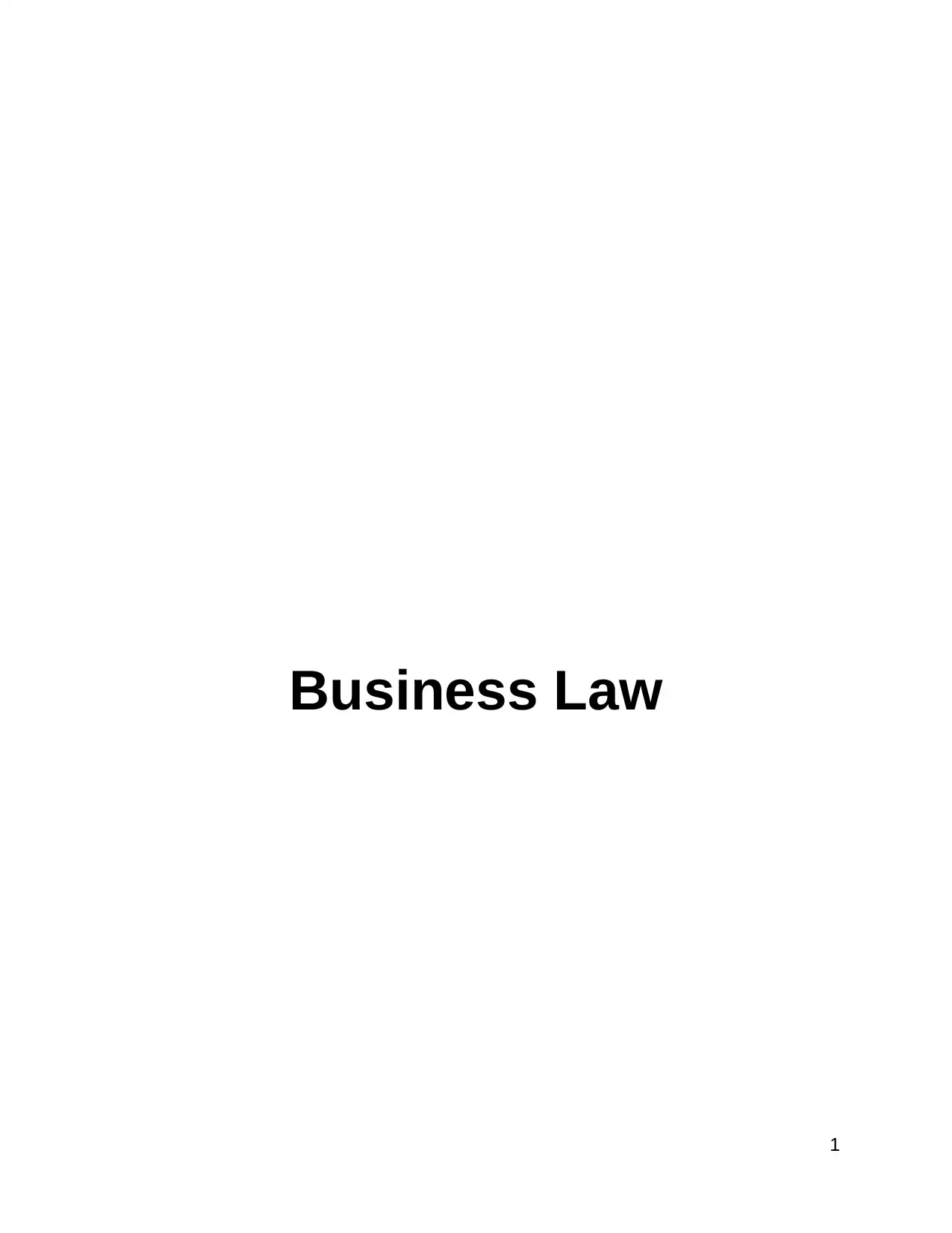
Business Law
1
1
Paraphrase This Document
Need a fresh take? Get an instant paraphrase of this document with our AI Paraphraser
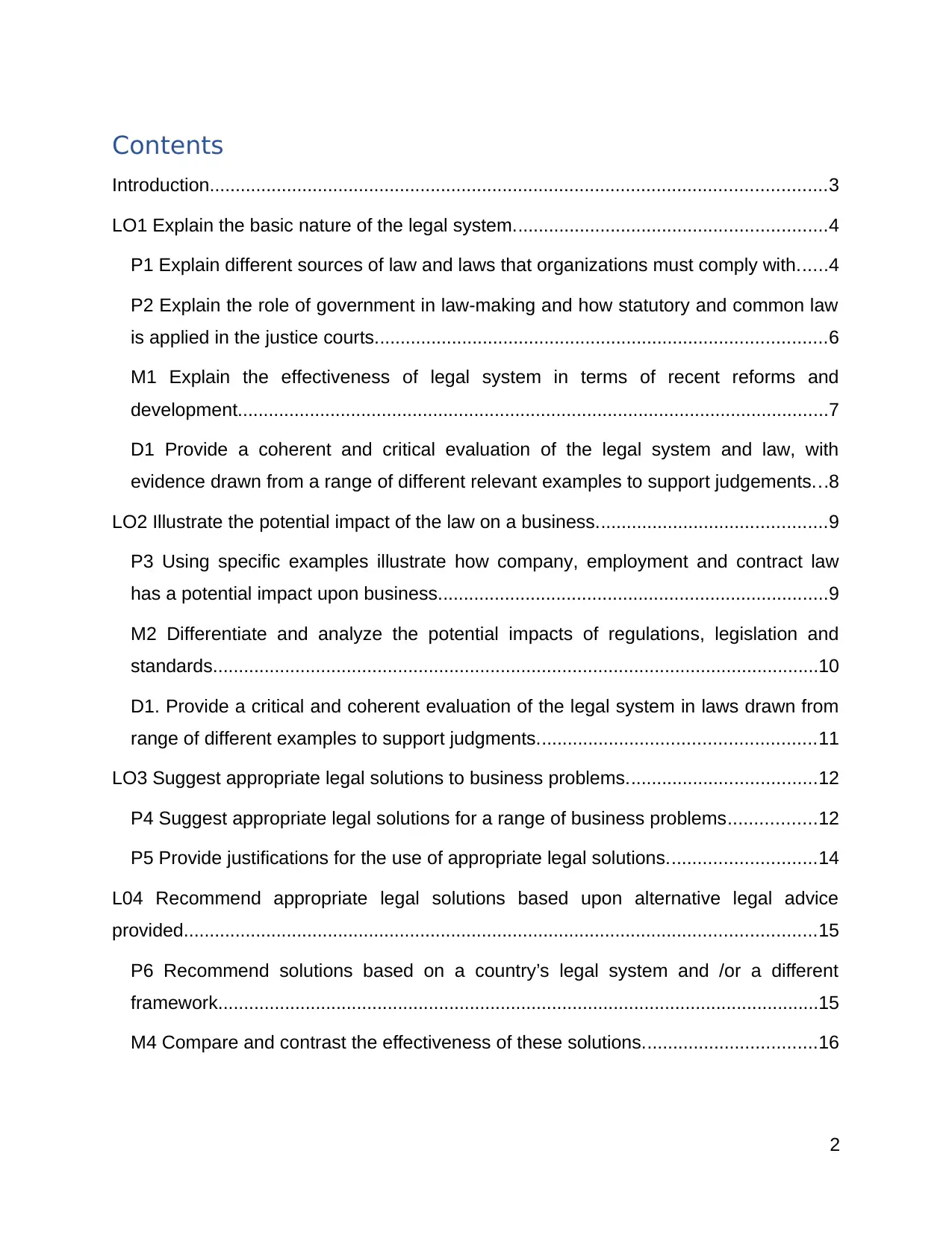
Contents
Introduction........................................................................................................................3
LO1 Explain the basic nature of the legal system.............................................................4
P1 Explain different sources of law and laws that organizations must comply with......4
P2 Explain the role of government in law-making and how statutory and common law
is applied in the justice courts........................................................................................6
M1 Explain the effectiveness of legal system in terms of recent reforms and
development...................................................................................................................7
D1 Provide a coherent and critical evaluation of the legal system and law, with
evidence drawn from a range of different relevant examples to support judgements...8
LO2 Illustrate the potential impact of the law on a business.............................................9
P3 Using specific examples illustrate how company, employment and contract law
has a potential impact upon business............................................................................9
M2 Differentiate and analyze the potential impacts of regulations, legislation and
standards......................................................................................................................10
D1. Provide a critical and coherent evaluation of the legal system in laws drawn from
range of different examples to support judgments......................................................11
LO3 Suggest appropriate legal solutions to business problems.....................................12
P4 Suggest appropriate legal solutions for a range of business problems.................12
P5 Provide justifications for the use of appropriate legal solutions.............................14
L04 Recommend appropriate legal solutions based upon alternative legal advice
provided...........................................................................................................................15
P6 Recommend solutions based on a country’s legal system and /or a different
framework.....................................................................................................................15
M4 Compare and contrast the effectiveness of these solutions..................................16
2
Introduction........................................................................................................................3
LO1 Explain the basic nature of the legal system.............................................................4
P1 Explain different sources of law and laws that organizations must comply with......4
P2 Explain the role of government in law-making and how statutory and common law
is applied in the justice courts........................................................................................6
M1 Explain the effectiveness of legal system in terms of recent reforms and
development...................................................................................................................7
D1 Provide a coherent and critical evaluation of the legal system and law, with
evidence drawn from a range of different relevant examples to support judgements...8
LO2 Illustrate the potential impact of the law on a business.............................................9
P3 Using specific examples illustrate how company, employment and contract law
has a potential impact upon business............................................................................9
M2 Differentiate and analyze the potential impacts of regulations, legislation and
standards......................................................................................................................10
D1. Provide a critical and coherent evaluation of the legal system in laws drawn from
range of different examples to support judgments......................................................11
LO3 Suggest appropriate legal solutions to business problems.....................................12
P4 Suggest appropriate legal solutions for a range of business problems.................12
P5 Provide justifications for the use of appropriate legal solutions.............................14
L04 Recommend appropriate legal solutions based upon alternative legal advice
provided...........................................................................................................................15
P6 Recommend solutions based on a country’s legal system and /or a different
framework.....................................................................................................................15
M4 Compare and contrast the effectiveness of these solutions..................................16
2
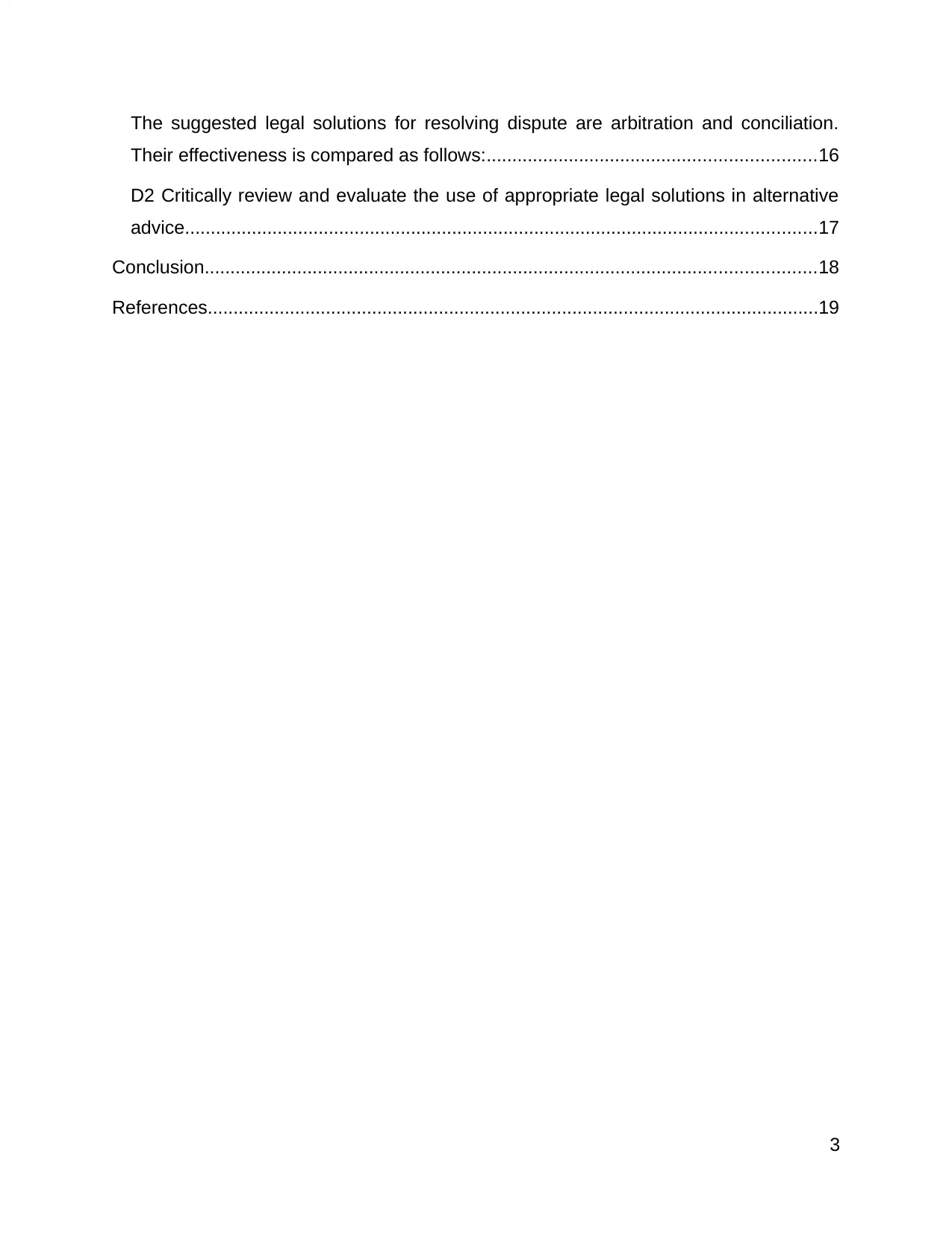
The suggested legal solutions for resolving dispute are arbitration and conciliation.
Their effectiveness is compared as follows:................................................................16
D2 Critically review and evaluate the use of appropriate legal solutions in alternative
advice...........................................................................................................................17
Conclusion.......................................................................................................................18
References.......................................................................................................................19
3
Their effectiveness is compared as follows:................................................................16
D2 Critically review and evaluate the use of appropriate legal solutions in alternative
advice...........................................................................................................................17
Conclusion.......................................................................................................................18
References.......................................................................................................................19
3
⊘ This is a preview!⊘
Do you want full access?
Subscribe today to unlock all pages.

Trusted by 1+ million students worldwide
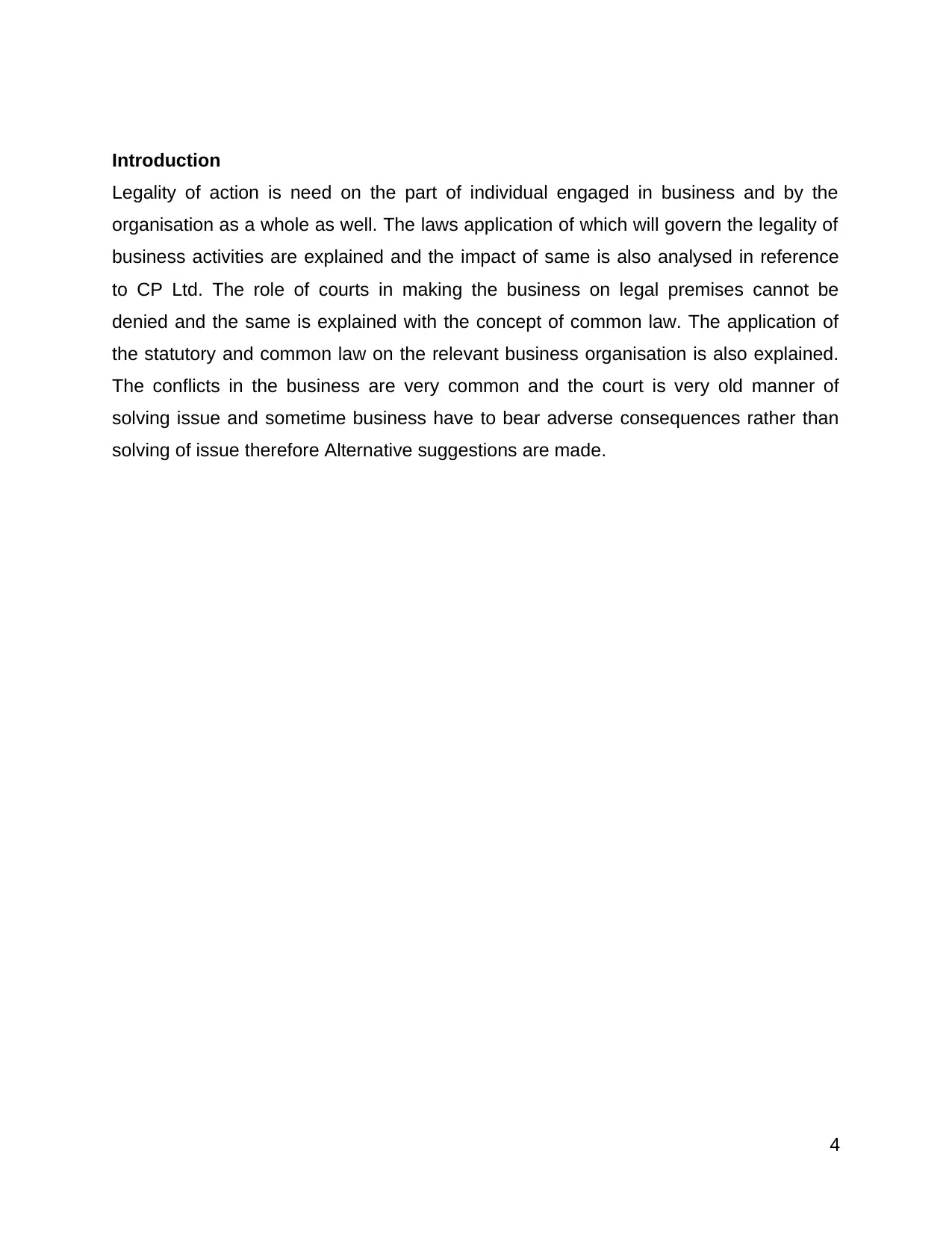
Introduction
Legality of action is need on the part of individual engaged in business and by the
organisation as a whole as well. The laws application of which will govern the legality of
business activities are explained and the impact of same is also analysed in reference
to CP Ltd. The role of courts in making the business on legal premises cannot be
denied and the same is explained with the concept of common law. The application of
the statutory and common law on the relevant business organisation is also explained.
The conflicts in the business are very common and the court is very old manner of
solving issue and sometime business have to bear adverse consequences rather than
solving of issue therefore Alternative suggestions are made.
4
Legality of action is need on the part of individual engaged in business and by the
organisation as a whole as well. The laws application of which will govern the legality of
business activities are explained and the impact of same is also analysed in reference
to CP Ltd. The role of courts in making the business on legal premises cannot be
denied and the same is explained with the concept of common law. The application of
the statutory and common law on the relevant business organisation is also explained.
The conflicts in the business are very common and the court is very old manner of
solving issue and sometime business have to bear adverse consequences rather than
solving of issue therefore Alternative suggestions are made.
4
Paraphrase This Document
Need a fresh take? Get an instant paraphrase of this document with our AI Paraphraser
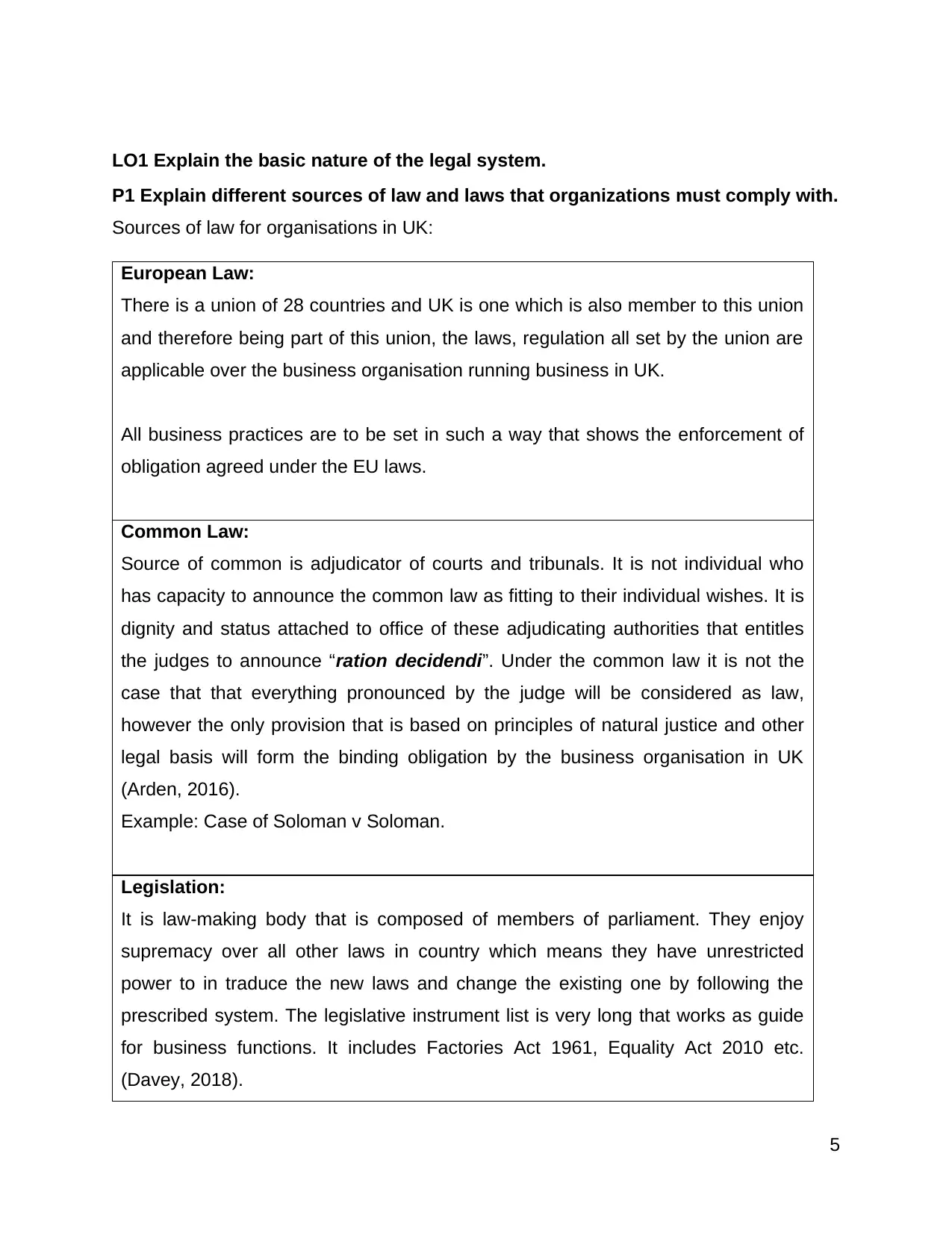
LO1 Explain the basic nature of the legal system.
P1 Explain different sources of law and laws that organizations must comply with.
Sources of law for organisations in UK:
European Law:
There is a union of 28 countries and UK is one which is also member to this union
and therefore being part of this union, the laws, regulation all set by the union are
applicable over the business organisation running business in UK.
All business practices are to be set in such a way that shows the enforcement of
obligation agreed under the EU laws.
Common Law:
Source of common is adjudicator of courts and tribunals. It is not individual who
has capacity to announce the common law as fitting to their individual wishes. It is
dignity and status attached to office of these adjudicating authorities that entitles
the judges to announce “ration decidendi”. Under the common law it is not the
case that that everything pronounced by the judge will be considered as law,
however the only provision that is based on principles of natural justice and other
legal basis will form the binding obligation by the business organisation in UK
(Arden, 2016).
Example: Case of Soloman v Soloman.
Legislation:
It is law-making body that is composed of members of parliament. They enjoy
supremacy over all other laws in country which means they have unrestricted
power to in traduce the new laws and change the existing one by following the
prescribed system. The legislative instrument list is very long that works as guide
for business functions. It includes Factories Act 1961, Equality Act 2010 etc.
(Davey, 2018).
5
P1 Explain different sources of law and laws that organizations must comply with.
Sources of law for organisations in UK:
European Law:
There is a union of 28 countries and UK is one which is also member to this union
and therefore being part of this union, the laws, regulation all set by the union are
applicable over the business organisation running business in UK.
All business practices are to be set in such a way that shows the enforcement of
obligation agreed under the EU laws.
Common Law:
Source of common is adjudicator of courts and tribunals. It is not individual who
has capacity to announce the common law as fitting to their individual wishes. It is
dignity and status attached to office of these adjudicating authorities that entitles
the judges to announce “ration decidendi”. Under the common law it is not the
case that that everything pronounced by the judge will be considered as law,
however the only provision that is based on principles of natural justice and other
legal basis will form the binding obligation by the business organisation in UK
(Arden, 2016).
Example: Case of Soloman v Soloman.
Legislation:
It is law-making body that is composed of members of parliament. They enjoy
supremacy over all other laws in country which means they have unrestricted
power to in traduce the new laws and change the existing one by following the
prescribed system. The legislative instrument list is very long that works as guide
for business functions. It includes Factories Act 1961, Equality Act 2010 etc.
(Davey, 2018).
5
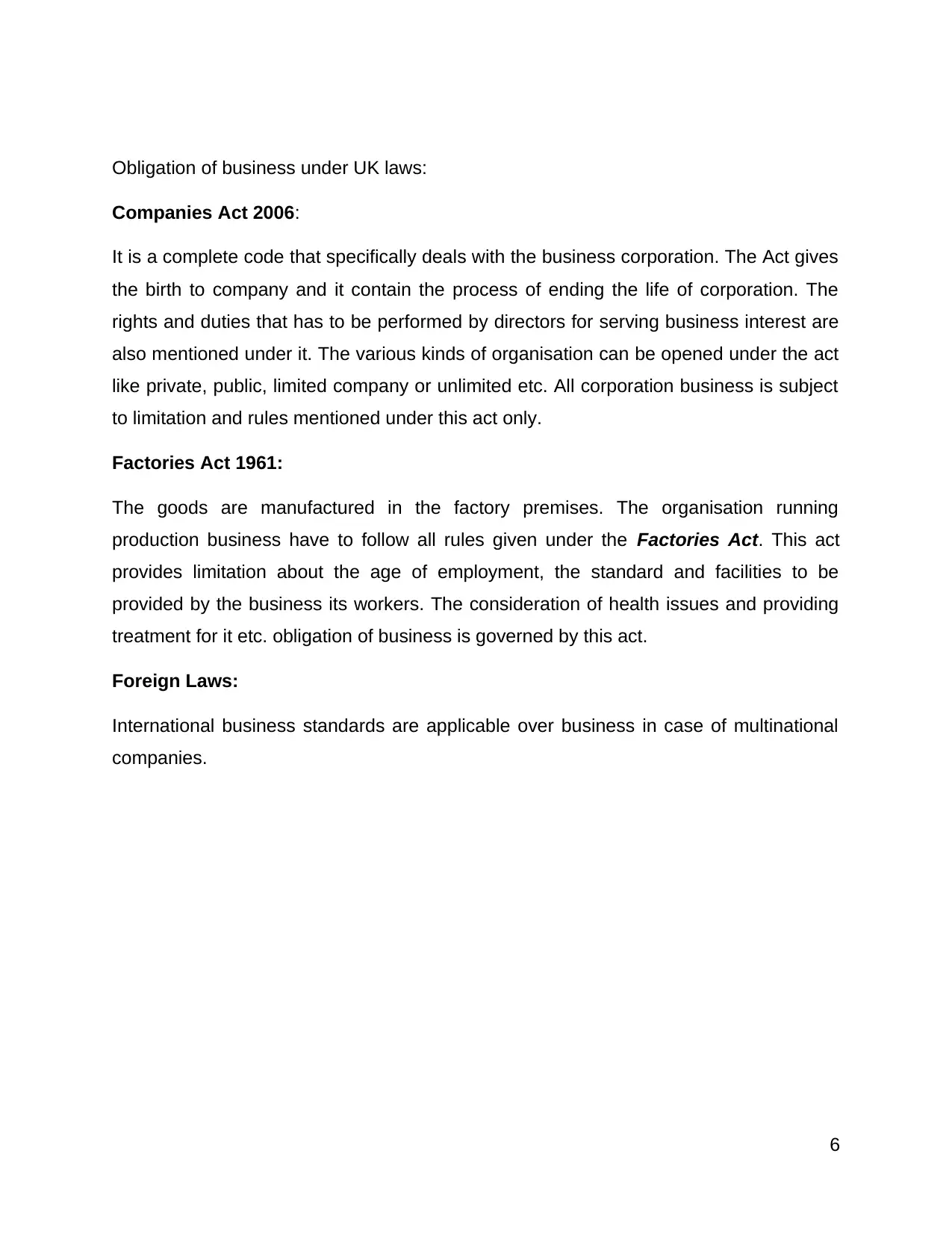
Obligation of business under UK laws:
Companies Act 2006:
It is a complete code that specifically deals with the business corporation. The Act gives
the birth to company and it contain the process of ending the life of corporation. The
rights and duties that has to be performed by directors for serving business interest are
also mentioned under it. The various kinds of organisation can be opened under the act
like private, public, limited company or unlimited etc. All corporation business is subject
to limitation and rules mentioned under this act only.
Factories Act 1961:
The goods are manufactured in the factory premises. The organisation running
production business have to follow all rules given under the Factories Act. This act
provides limitation about the age of employment, the standard and facilities to be
provided by the business its workers. The consideration of health issues and providing
treatment for it etc. obligation of business is governed by this act.
Foreign Laws:
International business standards are applicable over business in case of multinational
companies.
6
Companies Act 2006:
It is a complete code that specifically deals with the business corporation. The Act gives
the birth to company and it contain the process of ending the life of corporation. The
rights and duties that has to be performed by directors for serving business interest are
also mentioned under it. The various kinds of organisation can be opened under the act
like private, public, limited company or unlimited etc. All corporation business is subject
to limitation and rules mentioned under this act only.
Factories Act 1961:
The goods are manufactured in the factory premises. The organisation running
production business have to follow all rules given under the Factories Act. This act
provides limitation about the age of employment, the standard and facilities to be
provided by the business its workers. The consideration of health issues and providing
treatment for it etc. obligation of business is governed by this act.
Foreign Laws:
International business standards are applicable over business in case of multinational
companies.
6
⊘ This is a preview!⊘
Do you want full access?
Subscribe today to unlock all pages.

Trusted by 1+ million students worldwide
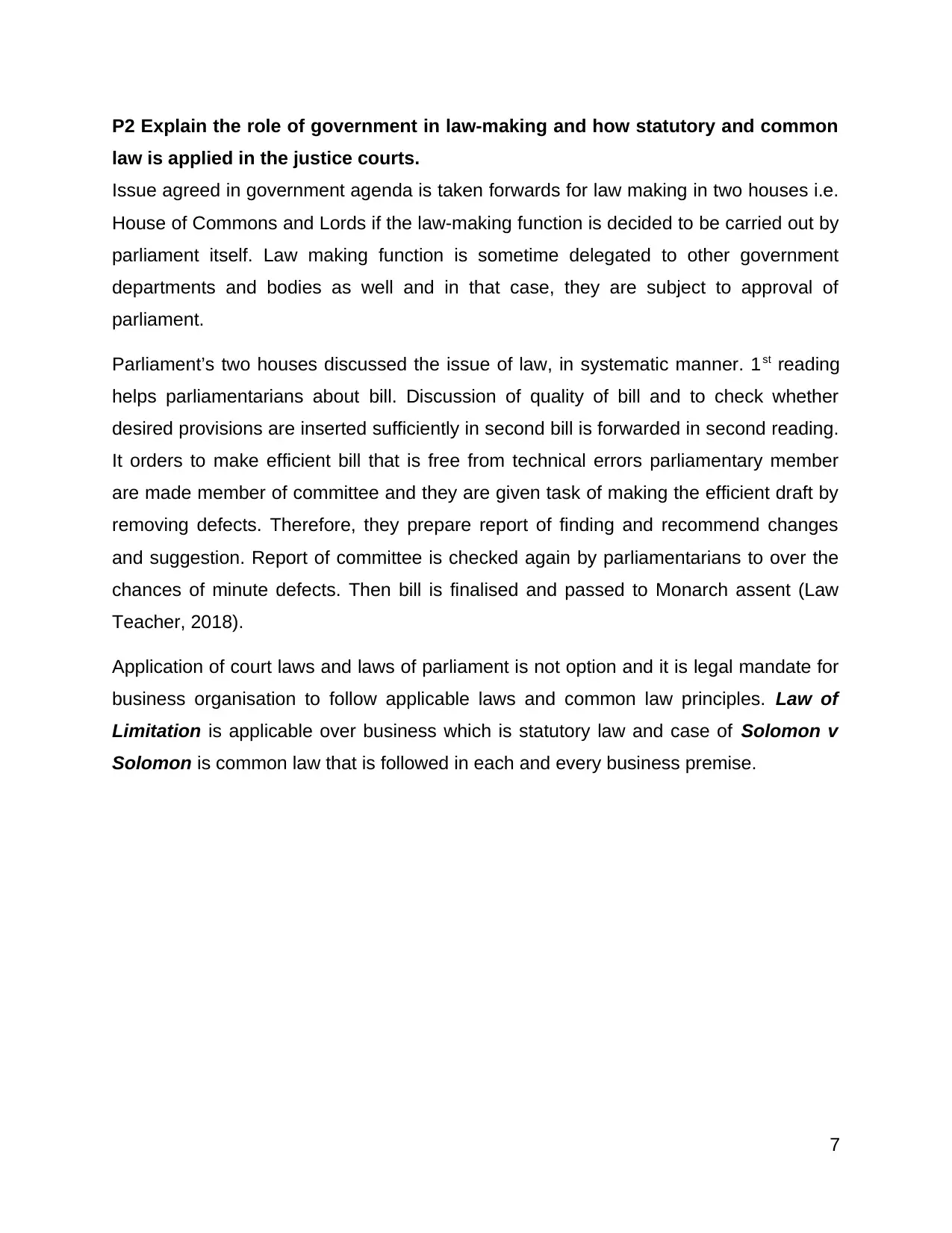
P2 Explain the role of government in law-making and how statutory and common
law is applied in the justice courts.
Issue agreed in government agenda is taken forwards for law making in two houses i.e.
House of Commons and Lords if the law-making function is decided to be carried out by
parliament itself. Law making function is sometime delegated to other government
departments and bodies as well and in that case, they are subject to approval of
parliament.
Parliament’s two houses discussed the issue of law, in systematic manner. 1st reading
helps parliamentarians about bill. Discussion of quality of bill and to check whether
desired provisions are inserted sufficiently in second bill is forwarded in second reading.
It orders to make efficient bill that is free from technical errors parliamentary member
are made member of committee and they are given task of making the efficient draft by
removing defects. Therefore, they prepare report of finding and recommend changes
and suggestion. Report of committee is checked again by parliamentarians to over the
chances of minute defects. Then bill is finalised and passed to Monarch assent (Law
Teacher, 2018).
Application of court laws and laws of parliament is not option and it is legal mandate for
business organisation to follow applicable laws and common law principles. Law of
Limitation is applicable over business which is statutory law and case of Solomon v
Solomon is common law that is followed in each and every business premise.
7
law is applied in the justice courts.
Issue agreed in government agenda is taken forwards for law making in two houses i.e.
House of Commons and Lords if the law-making function is decided to be carried out by
parliament itself. Law making function is sometime delegated to other government
departments and bodies as well and in that case, they are subject to approval of
parliament.
Parliament’s two houses discussed the issue of law, in systematic manner. 1st reading
helps parliamentarians about bill. Discussion of quality of bill and to check whether
desired provisions are inserted sufficiently in second bill is forwarded in second reading.
It orders to make efficient bill that is free from technical errors parliamentary member
are made member of committee and they are given task of making the efficient draft by
removing defects. Therefore, they prepare report of finding and recommend changes
and suggestion. Report of committee is checked again by parliamentarians to over the
chances of minute defects. Then bill is finalised and passed to Monarch assent (Law
Teacher, 2018).
Application of court laws and laws of parliament is not option and it is legal mandate for
business organisation to follow applicable laws and common law principles. Law of
Limitation is applicable over business which is statutory law and case of Solomon v
Solomon is common law that is followed in each and every business premise.
7
Paraphrase This Document
Need a fresh take? Get an instant paraphrase of this document with our AI Paraphraser
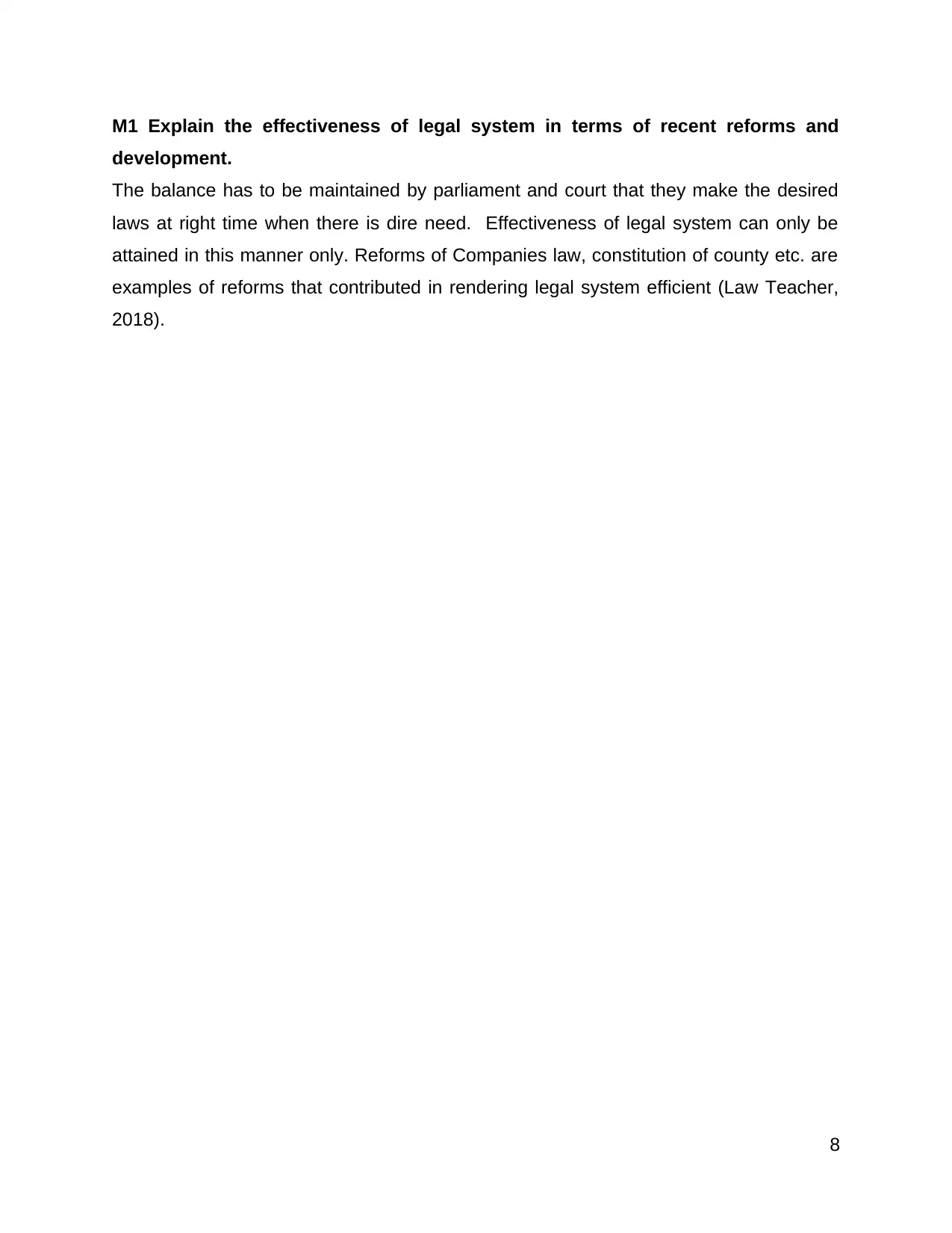
M1 Explain the effectiveness of legal system in terms of recent reforms and
development.
The balance has to be maintained by parliament and court that they make the desired
laws at right time when there is dire need. Effectiveness of legal system can only be
attained in this manner only. Reforms of Companies law, constitution of county etc. are
examples of reforms that contributed in rendering legal system efficient (Law Teacher,
2018).
8
development.
The balance has to be maintained by parliament and court that they make the desired
laws at right time when there is dire need. Effectiveness of legal system can only be
attained in this manner only. Reforms of Companies law, constitution of county etc. are
examples of reforms that contributed in rendering legal system efficient (Law Teacher,
2018).
8
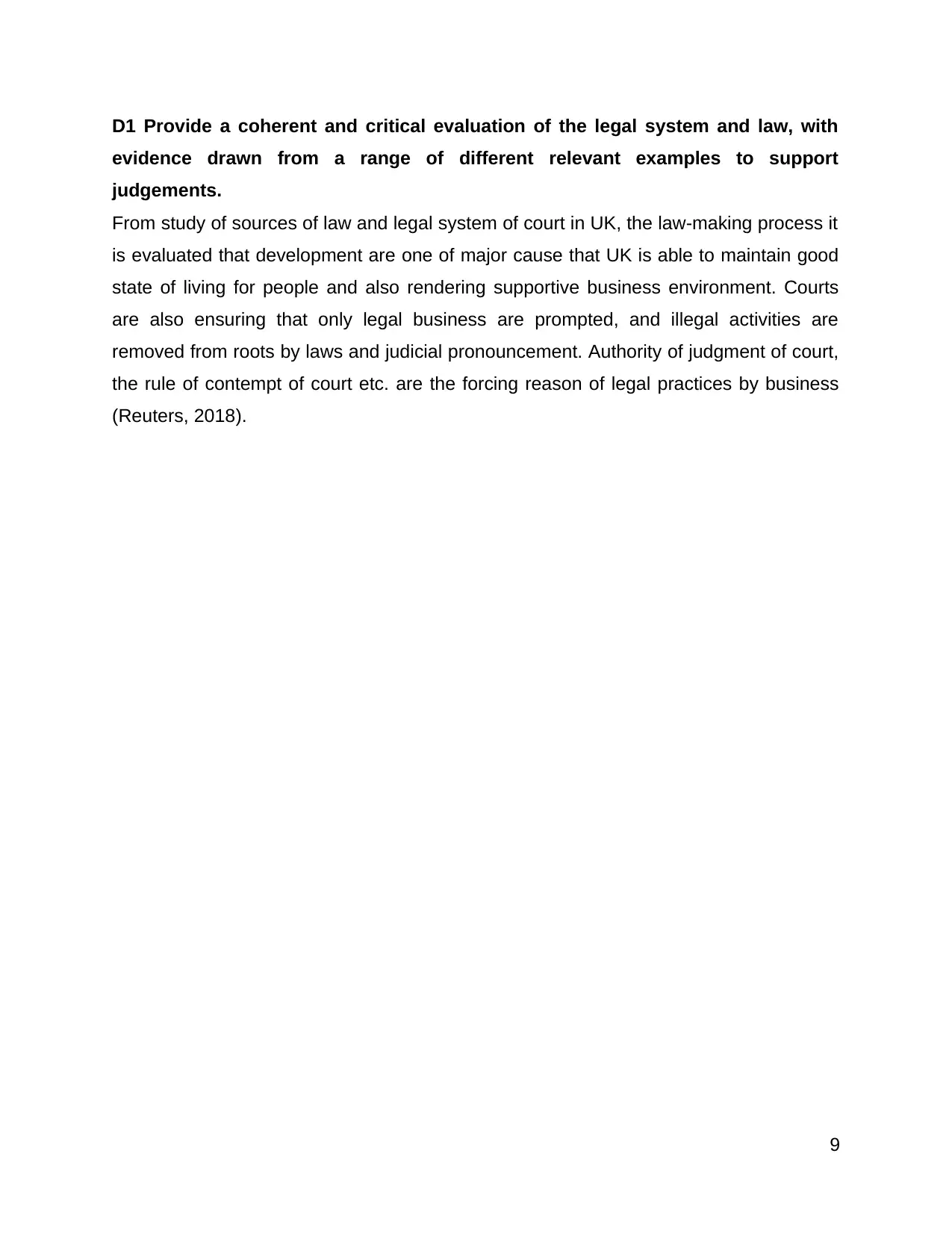
D1 Provide a coherent and critical evaluation of the legal system and law, with
evidence drawn from a range of different relevant examples to support
judgements.
From study of sources of law and legal system of court in UK, the law-making process it
is evaluated that development are one of major cause that UK is able to maintain good
state of living for people and also rendering supportive business environment. Courts
are also ensuring that only legal business are prompted, and illegal activities are
removed from roots by laws and judicial pronouncement. Authority of judgment of court,
the rule of contempt of court etc. are the forcing reason of legal practices by business
(Reuters, 2018).
9
evidence drawn from a range of different relevant examples to support
judgements.
From study of sources of law and legal system of court in UK, the law-making process it
is evaluated that development are one of major cause that UK is able to maintain good
state of living for people and also rendering supportive business environment. Courts
are also ensuring that only legal business are prompted, and illegal activities are
removed from roots by laws and judicial pronouncement. Authority of judgment of court,
the rule of contempt of court etc. are the forcing reason of legal practices by business
(Reuters, 2018).
9
⊘ This is a preview!⊘
Do you want full access?
Subscribe today to unlock all pages.

Trusted by 1+ million students worldwide
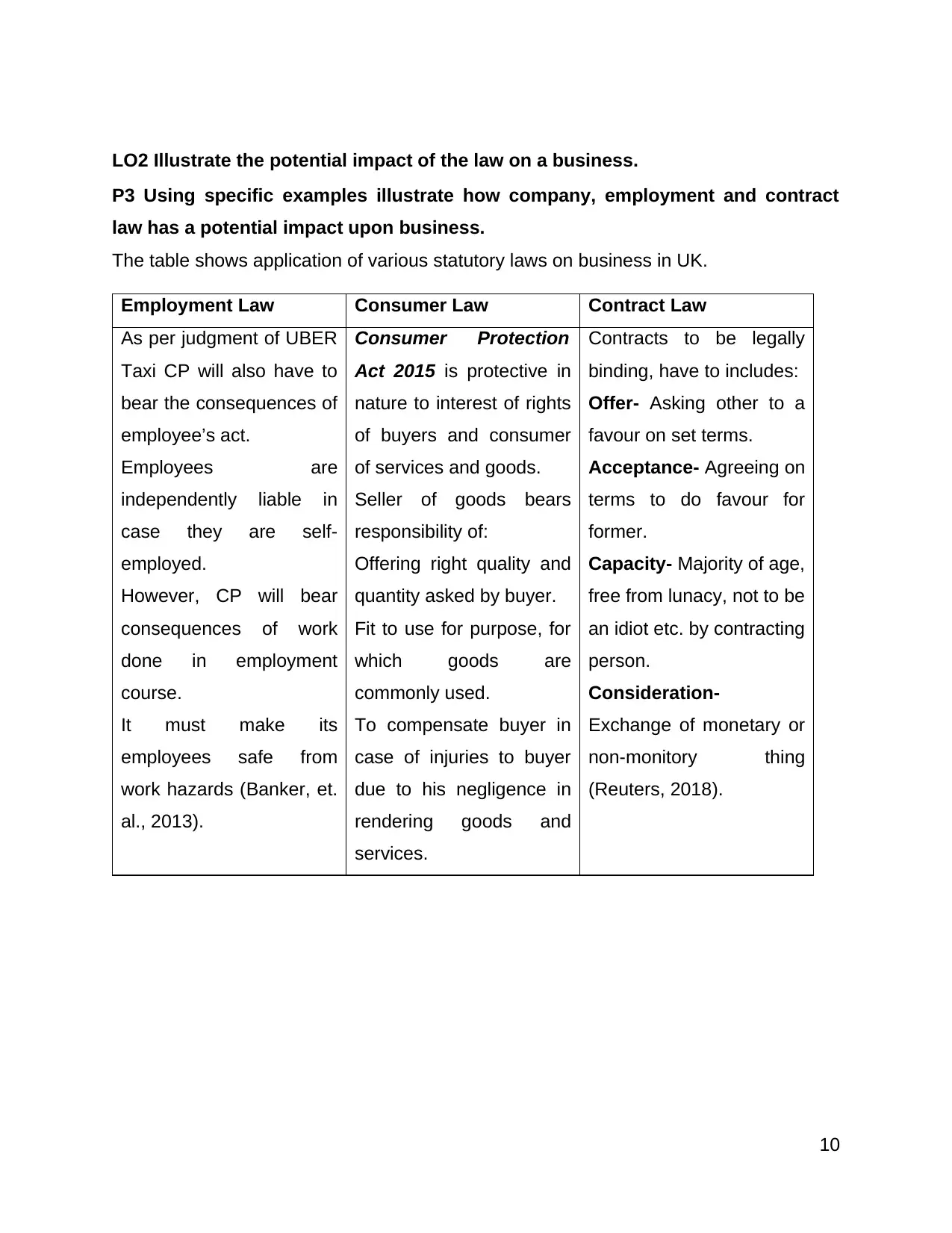
LO2 Illustrate the potential impact of the law on a business.
P3 Using specific examples illustrate how company, employment and contract
law has a potential impact upon business.
The table shows application of various statutory laws on business in UK.
Employment Law Consumer Law Contract Law
As per judgment of UBER
Taxi CP will also have to
bear the consequences of
employee’s act.
Employees are
independently liable in
case they are self-
employed.
However, CP will bear
consequences of work
done in employment
course.
It must make its
employees safe from
work hazards (Banker, et.
al., 2013).
Consumer Protection
Act 2015 is protective in
nature to interest of rights
of buyers and consumer
of services and goods.
Seller of goods bears
responsibility of:
Offering right quality and
quantity asked by buyer.
Fit to use for purpose, for
which goods are
commonly used.
To compensate buyer in
case of injuries to buyer
due to his negligence in
rendering goods and
services.
Contracts to be legally
binding, have to includes:
Offer- Asking other to a
favour on set terms.
Acceptance- Agreeing on
terms to do favour for
former.
Capacity- Majority of age,
free from lunacy, not to be
an idiot etc. by contracting
person.
Consideration-
Exchange of monetary or
non-monitory thing
(Reuters, 2018).
10
P3 Using specific examples illustrate how company, employment and contract
law has a potential impact upon business.
The table shows application of various statutory laws on business in UK.
Employment Law Consumer Law Contract Law
As per judgment of UBER
Taxi CP will also have to
bear the consequences of
employee’s act.
Employees are
independently liable in
case they are self-
employed.
However, CP will bear
consequences of work
done in employment
course.
It must make its
employees safe from
work hazards (Banker, et.
al., 2013).
Consumer Protection
Act 2015 is protective in
nature to interest of rights
of buyers and consumer
of services and goods.
Seller of goods bears
responsibility of:
Offering right quality and
quantity asked by buyer.
Fit to use for purpose, for
which goods are
commonly used.
To compensate buyer in
case of injuries to buyer
due to his negligence in
rendering goods and
services.
Contracts to be legally
binding, have to includes:
Offer- Asking other to a
favour on set terms.
Acceptance- Agreeing on
terms to do favour for
former.
Capacity- Majority of age,
free from lunacy, not to be
an idiot etc. by contracting
person.
Consideration-
Exchange of monetary or
non-monitory thing
(Reuters, 2018).
10
Paraphrase This Document
Need a fresh take? Get an instant paraphrase of this document with our AI Paraphraser
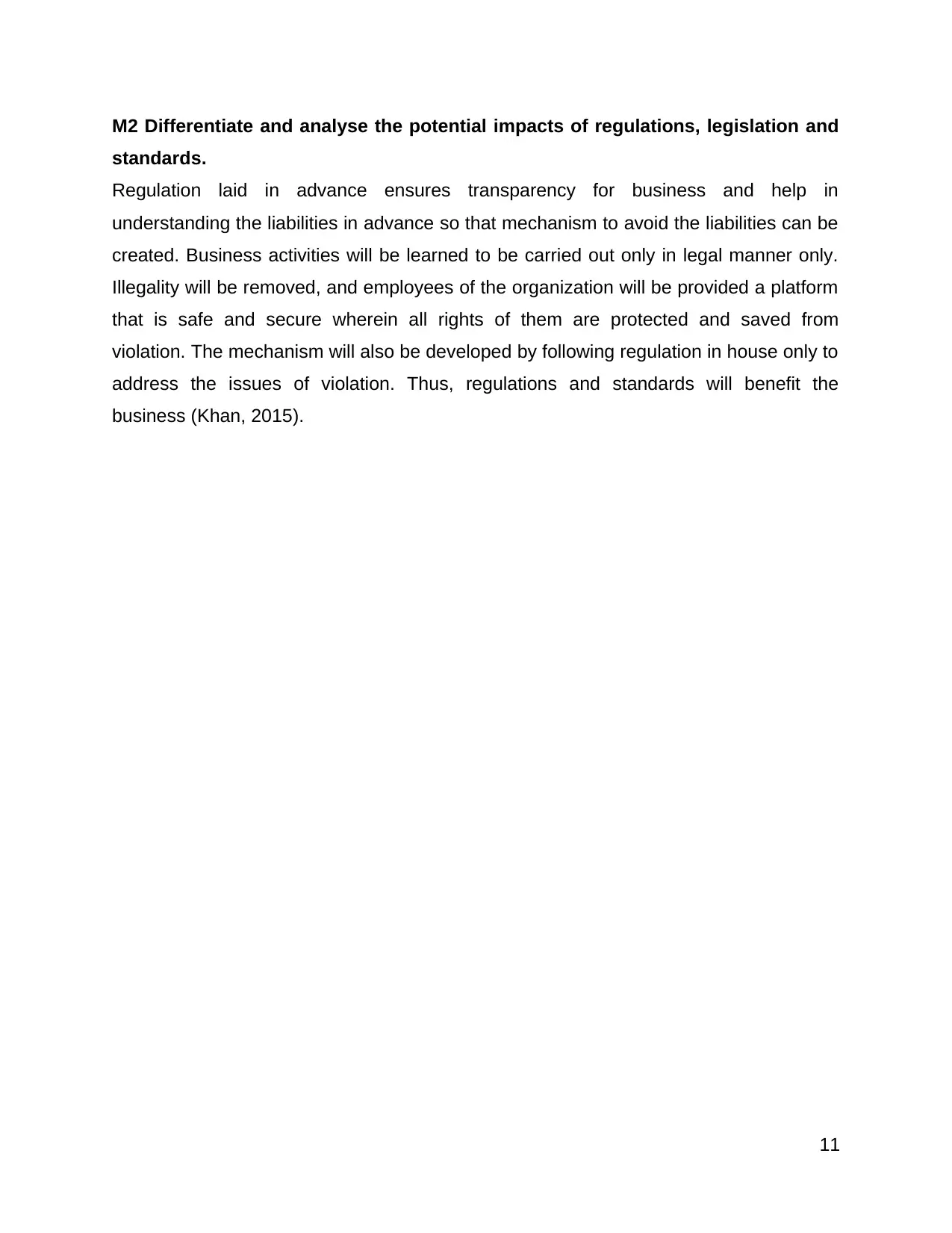
M2 Differentiate and analyse the potential impacts of regulations, legislation and
standards.
Regulation laid in advance ensures transparency for business and help in
understanding the liabilities in advance so that mechanism to avoid the liabilities can be
created. Business activities will be learned to be carried out only in legal manner only.
Illegality will be removed, and employees of the organization will be provided a platform
that is safe and secure wherein all rights of them are protected and saved from
violation. The mechanism will also be developed by following regulation in house only to
address the issues of violation. Thus, regulations and standards will benefit the
business (Khan, 2015).
11
standards.
Regulation laid in advance ensures transparency for business and help in
understanding the liabilities in advance so that mechanism to avoid the liabilities can be
created. Business activities will be learned to be carried out only in legal manner only.
Illegality will be removed, and employees of the organization will be provided a platform
that is safe and secure wherein all rights of them are protected and saved from
violation. The mechanism will also be developed by following regulation in house only to
address the issues of violation. Thus, regulations and standards will benefit the
business (Khan, 2015).
11
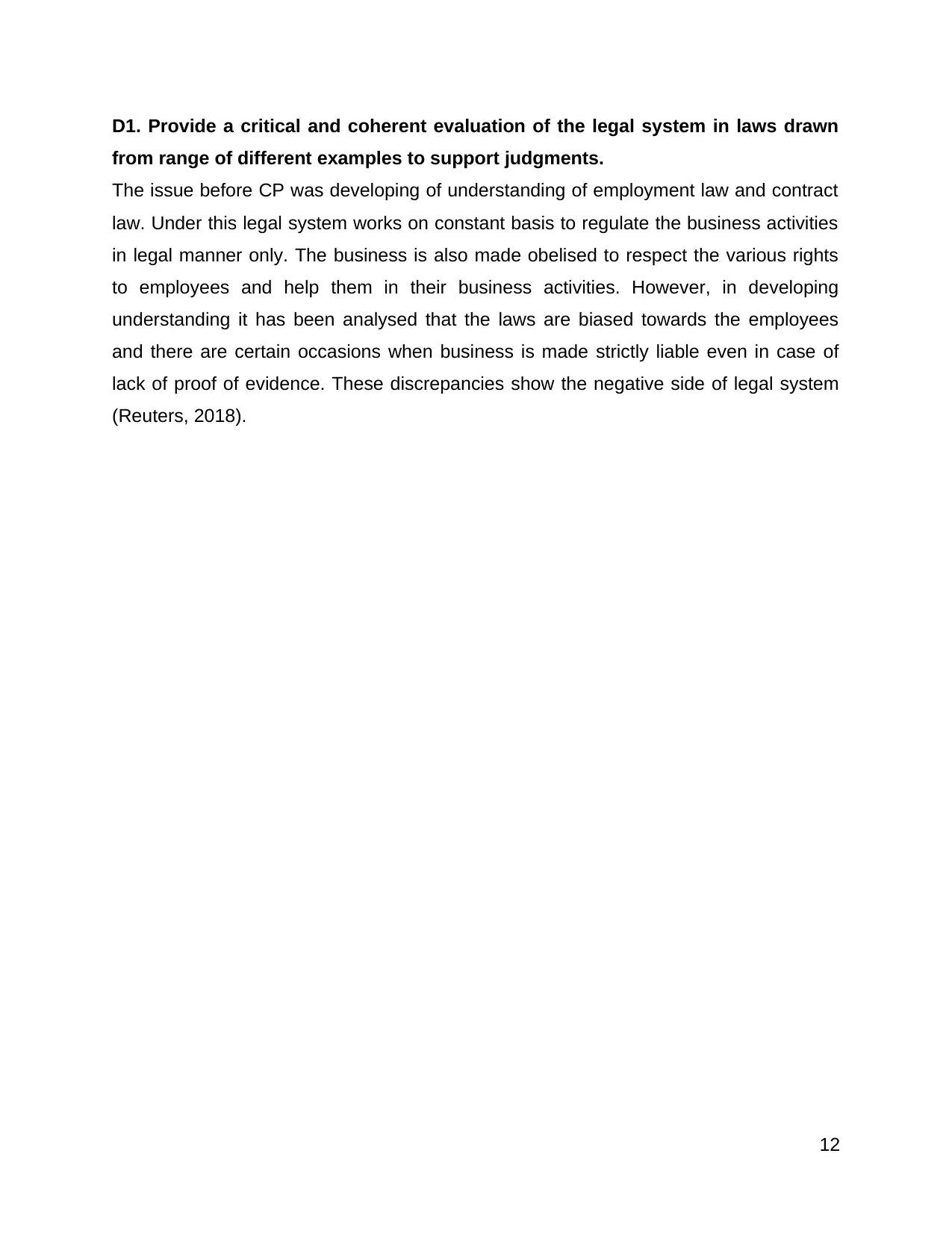
D1. Provide a critical and coherent evaluation of the legal system in laws drawn
from range of different examples to support judgments.
The issue before CP was developing of understanding of employment law and contract
law. Under this legal system works on constant basis to regulate the business activities
in legal manner only. The business is also made obelised to respect the various rights
to employees and help them in their business activities. However, in developing
understanding it has been analysed that the laws are biased towards the employees
and there are certain occasions when business is made strictly liable even in case of
lack of proof of evidence. These discrepancies show the negative side of legal system
(Reuters, 2018).
12
from range of different examples to support judgments.
The issue before CP was developing of understanding of employment law and contract
law. Under this legal system works on constant basis to regulate the business activities
in legal manner only. The business is also made obelised to respect the various rights
to employees and help them in their business activities. However, in developing
understanding it has been analysed that the laws are biased towards the employees
and there are certain occasions when business is made strictly liable even in case of
lack of proof of evidence. These discrepancies show the negative side of legal system
(Reuters, 2018).
12
⊘ This is a preview!⊘
Do you want full access?
Subscribe today to unlock all pages.

Trusted by 1+ million students worldwide
1 out of 20
Related Documents
Your All-in-One AI-Powered Toolkit for Academic Success.
+13062052269
info@desklib.com
Available 24*7 on WhatsApp / Email
![[object Object]](/_next/static/media/star-bottom.7253800d.svg)
Unlock your academic potential
Copyright © 2020–2026 A2Z Services. All Rights Reserved. Developed and managed by ZUCOL.





